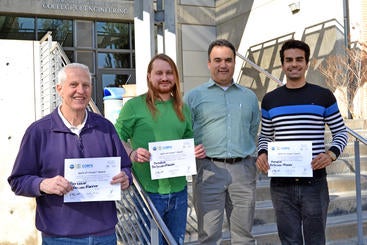A team of UC Riverside mechanical engineering doctoral students received the notable “Spirit of I-Corps” award to cap the meeting of the National Science Foundation’s Innovation Corps, or I-Corps, 2019 San Francisco winter cohort. David Halaney and Nami Davoodzadeh were recognized for their openness, commitment, and intellectual honesty in market discovery efforts regarding a new blood monitoring device.
The I-Corps program helps National Science Foundation grantees learn to assess valuable product opportunities often emerging from academic research and gain skills in entrepreneurship through training in market research and business practices from successful entrepreneurs.
Davoodzadeh invented a portable blood perfusion monitor device that images blood flow noninvasively by reflecting low-power laser light off of tissue and into a camera. It uses a new method of processing the data that requires less computing power than existing methods. As a result, mini-processors can be used in place of full computer processors, allowing for miniaturization of the device and reduced costs. The device could allow for routine blood perfusion monitoring, including post-surgery or even in preventative medicine. The technology also eliminates the need for a standalone diagnostic technician and could be useful in remote and field locations for first responders and the military.
Davoodzadeh and entrepreneurial lead Halaney have been working with Stephen Sharp, an entrepreneur-in-residence at UC Riverside’s Entrepreneurial, Proof of Concept, and Innovation Center, or EPIC , to identify market opportunities and develop a business plan. The team was one of 24 included in the 2019 San Francisco I-Corps cohort that interviewed more than 100 surgeons and medical professionals over the cohort’s seven weeks of training and market discovery. The instructors chose UC Riverside’s portable perfusion monitor team for the Spirit of I-Corps award, presented during the cohort’s final session on March 12.
